They saw Tadej Pogačar's 2020 Tour de France win coming miles away
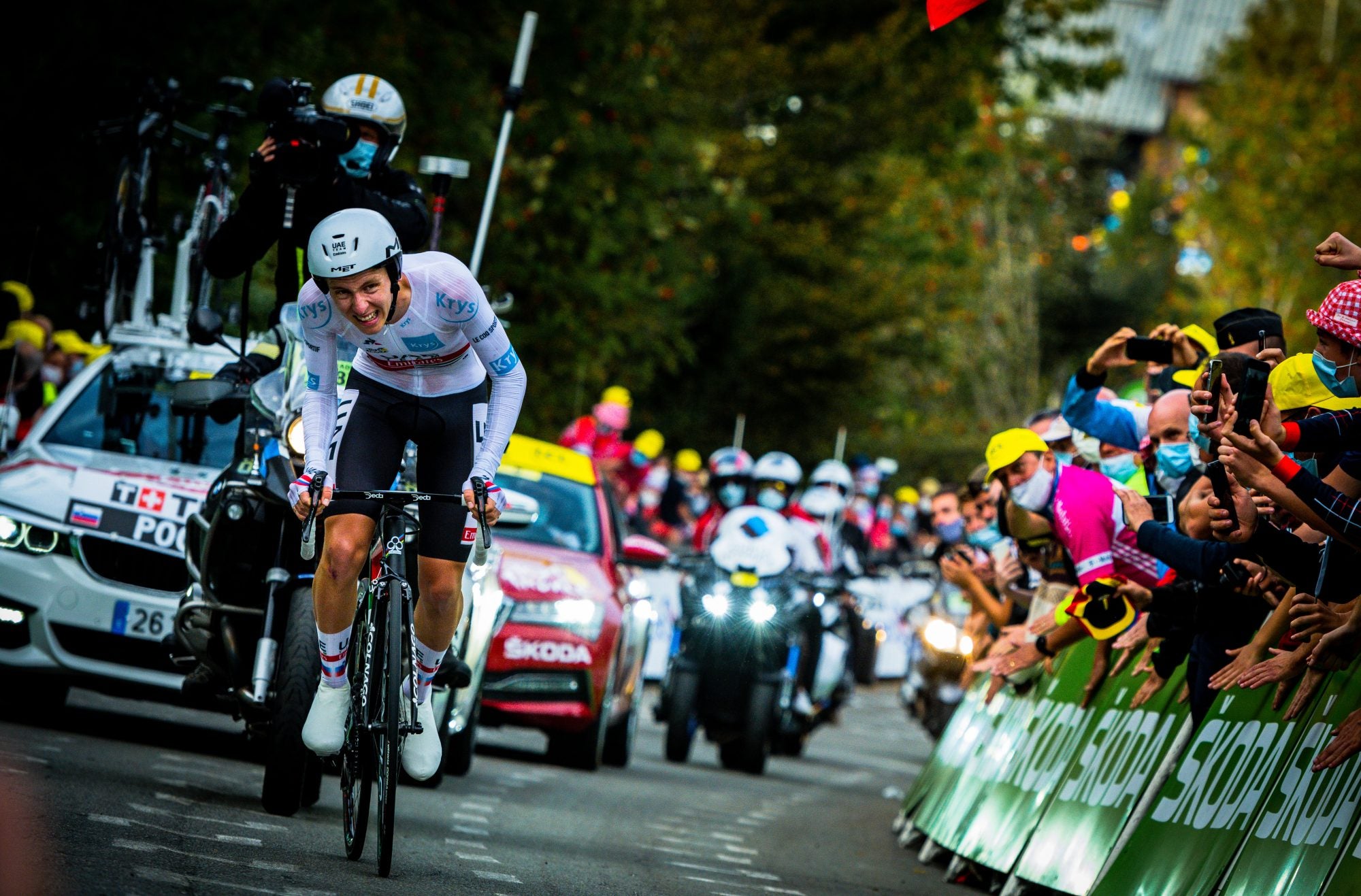
Pogačar raced into yellow on the Belles Filles. (Photo: James Startt)
This story appeared in the January/February issue of VeloNews magazine.
On the surface, Tadej Pogačar appeared to be just as gobsmacked as everyone else.
Pogačar looked out at the small collection of fans and fellow competitors atop La Planche des Belles Filles, and perfectly encapsulated the feeling of astonishment that sprouted from his jaw-dropping ride during the Tour de France’s stage 20 individual time trial — a heroic ride that ultimately won him the yellow jersey.
“I don’t know what to say,” Pogačar said. “I think I’m dreaming.”
Across the globe, millions of cycling fans expressed a similar feeling. Pogačar, after all, had started the day 57 seconds behind his Slovenian countryman, Primož Roglič, whose grasp on the yellow jersey seemed insurmountable. And yet, Pogačar had smashed Roglič by nearly two minutes across just 36.2 kilometers of road.
It was a reversal of fortune that was destined to go down in Tour de France history alongside LeMond vs. Fignon. Pogačar’s win was the stuff of fairy tales. Nobody saw it coming.
Nobody, really? As it turns out, there were a few people within Pogačar’s camp who believed — nee, were convinced — that the 21-year-old wunderkind was going to win, despite his disadvantage. In the following pages, we explore why these men expected the unexpected on that crisp day on La Planche des Belles Filles.
A body that doesn’t fatigue
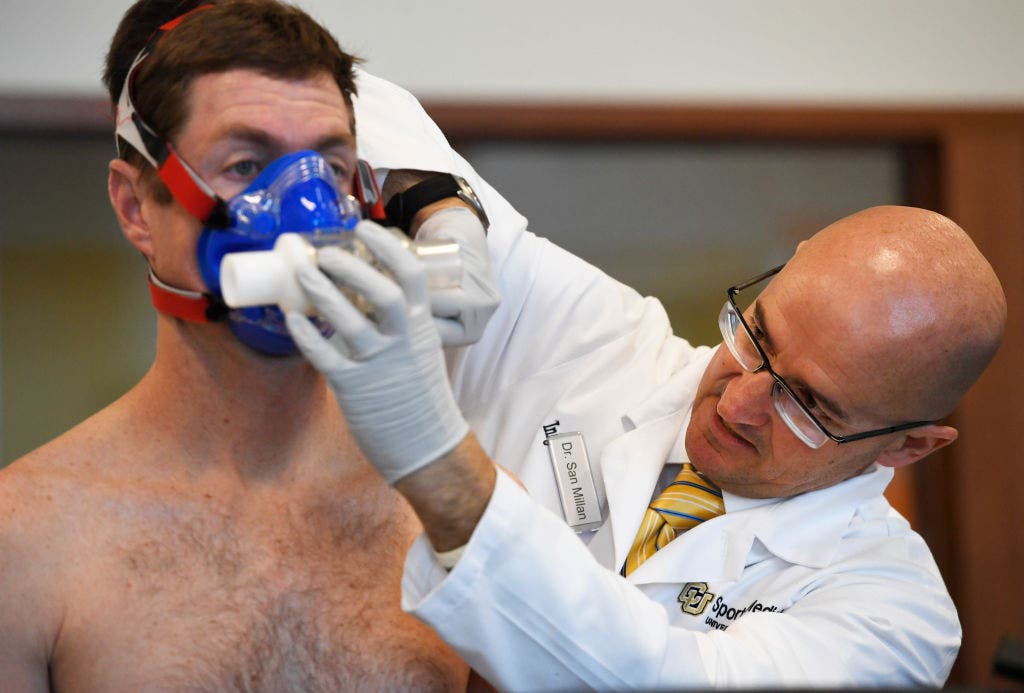
Dr. Inigo San Millan is obsessed with mitochondria, those microscopic organelles that generate energy for our cells. This obsession has led San Millan to spend 25 years studying how the human body’s metabolic cycle impacts diseases like cancer and diabetes. At the University of Colorado, where San Millan is a professor, he is known best for his cancer research.
Within the cycling world, San Millan is known for something else entirely: Speed. For the last two decades, he has helped endurance athletes around the globe harness the power of their body’s metabolic cycle to run, swim, or pedal harder and faster. In 2018 San Millan signed on to work with UAE-Team Emirates, and in 2019 he began coaching the team’s new hire, the then 19-year-old prodigy, Pogačar.
“I remember we were driving to a team presentation and I was getting to know him,” San Millan told VeloNews. “He was excited because now he could train several hours a day instead of having to go to school. I was like, ‘Wow, how many kids are at the WorldTour level who were just in school?’”
In his first month working with Pogačar, San Millan was impressed by the youngster’s calm and collected attitude. Pogačar seemed cool and at ease even before stressful stages and at crucial moments in the race. He also came across as wise beyond his years — a feature San Millan saw firsthand during Pogačar’s winning ride at the Amgen Tour of California.
At a crucial moment prior to the race’s summit finish to Mount Baldy, Pogačar was off the front with other contenders, and attacks began to fly on a small climb. Rather than attack, Pogačar simply rode alongside the other men. When San Millan asked him after the stage about the moment, Pogačar informed him that he was analyzing his contenders prior to the next day’s decisive climb.
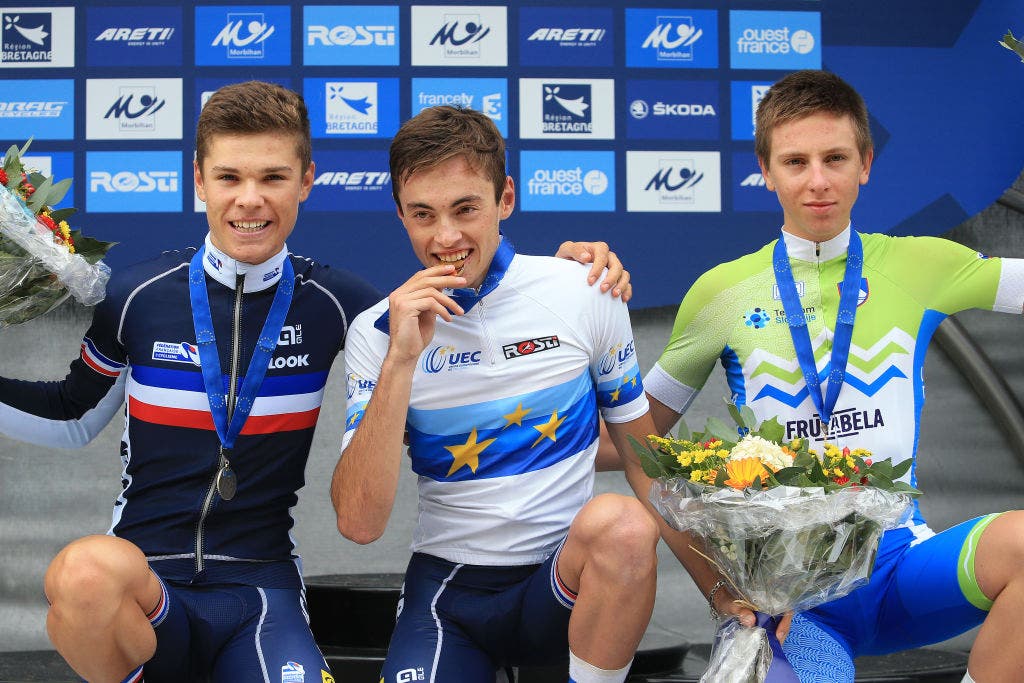
“He said ‘I want to look at their faces and listen to them breathing,’” San Millan said. “I’m like what the heck, guy? Everybody is attacking and suffering and he is so calm he wants to listen to his enemies breathe.”
Pogačar’s physiology also caught San Millan’s attention. San Millan had him perform his own personal lactate threshold test, which adds 10 minutes to the standard 30-minute effort. San Millan would not divulge Pogačar’s threshold power — that’s a number that pro riders and managers guard — however, he said the result was the among best he’s seen in his 25 years of testing athletes.
“With Tadej it was like, ‘Oh my gosh, are you kidding me?’ San Millan said. “This guy is at a whole different level.”
And Pogačar’s most incredible strength took weeks to reveal itself to San Millan. Pogačar went on a tear during the early months of 2019, winning or finishing in the top-10 in every stage race he started. Throughout that period, San Millan had Pogačar pedaling long, punishing miles in his training. To his surprise, Pogačar’s young body soaked up the torturous workouts without so much as a bad workout or a day with tired legs.
“What you see with even good athletes is they can do a very good day or week, and tomorrow they are tired,” San Millan said. “Tadej isn’t like that. He can do massive training without falling apart or having a bad day.”
While San Millan had anecdotal evidence of Pogačar’s greatness, he wanted to see Pogačar’s chemistry up close. And so, in late 2019, he conducted several blood tests that analyze a variety of metabolic parameters, from glucose utilization to his body’s ability to break down amino acids, to his overall capacity for fatigue. The tests centered on his favorite topic: Mitochondria.
San Millan loves science, and during this interview, he lit up with an energetic fervor when discussing the various tests he used to analyze Pogačar’s metabolic capacity. His explanation of the science behind the tests, and what it revealed, went on for more than half an hour.
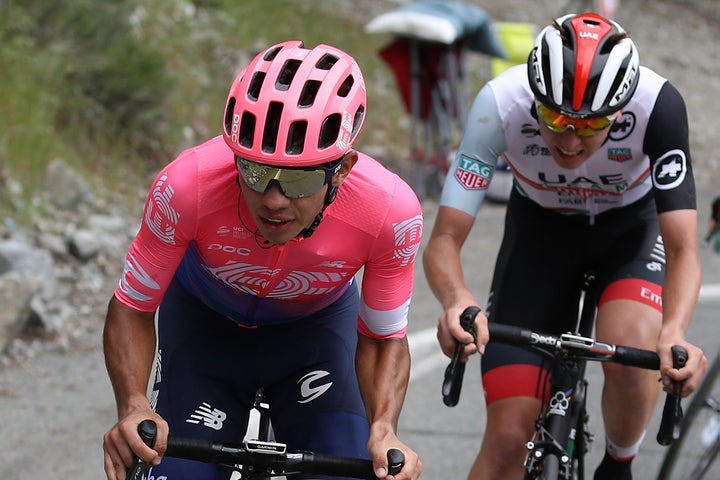
After these tests, San Millan realized just how special Tadej Pogačar was to the UAE-Team Emirates squad.
“The recovery capacity he has is from a whole different world,” San Millan said. “It is much better than the rest. It is like twice as good. That’s when we were shocked. And it makes sense. It’s like this guy just doesn’t deteriorate as much as the others in a stage race, and he’s only 20.”
Pogačar doesn’t deteriorate as much as the others — with that type of skill, was it possible to flourish in the final hard moments of a three-week stage race? The 2019 Vuelta a España appeared to confirm this physiological trait. In his grand tour debut, Pogačar scored two stage wins during the race’s first half, despite losing time on GC.
Then, on stage 20, the final mountain stage of the race, Pogačar threw caution to the wind and attacked the tired peloton nearly 40 kilometers from the finish. He was in fifth place on GC, nearly five minutes down on Roglič, and he wanted to land on the podium. As the top GC teams tried to control the pace, Pogačar powered away on the hilly terrain. By the end of the stage, he had leapfrogged Nairo Quintana and Miguel Ángel López on GC, and was only 22 seconds off of second-place Alejandro Valverde.
San Millan watched the race from his home in Colorado and marveled at what he saw. Earlier in the day, San Millan had opened his email inbox and found a new email — it was from Pogačar, who had messaged him just prior to the stage.
“He writes, ‘OK, there are four climbs today, when do you want me to attack. You pick,’” San Millan said, laughing. “He knew he had it. That’s how he thinks. He’s a freaking killer, man.”
At that moment, San Millan became convinced that Tadej Pogačar had the physical and mental gifts to be a Tour de France champion.
A brain that feels no stress
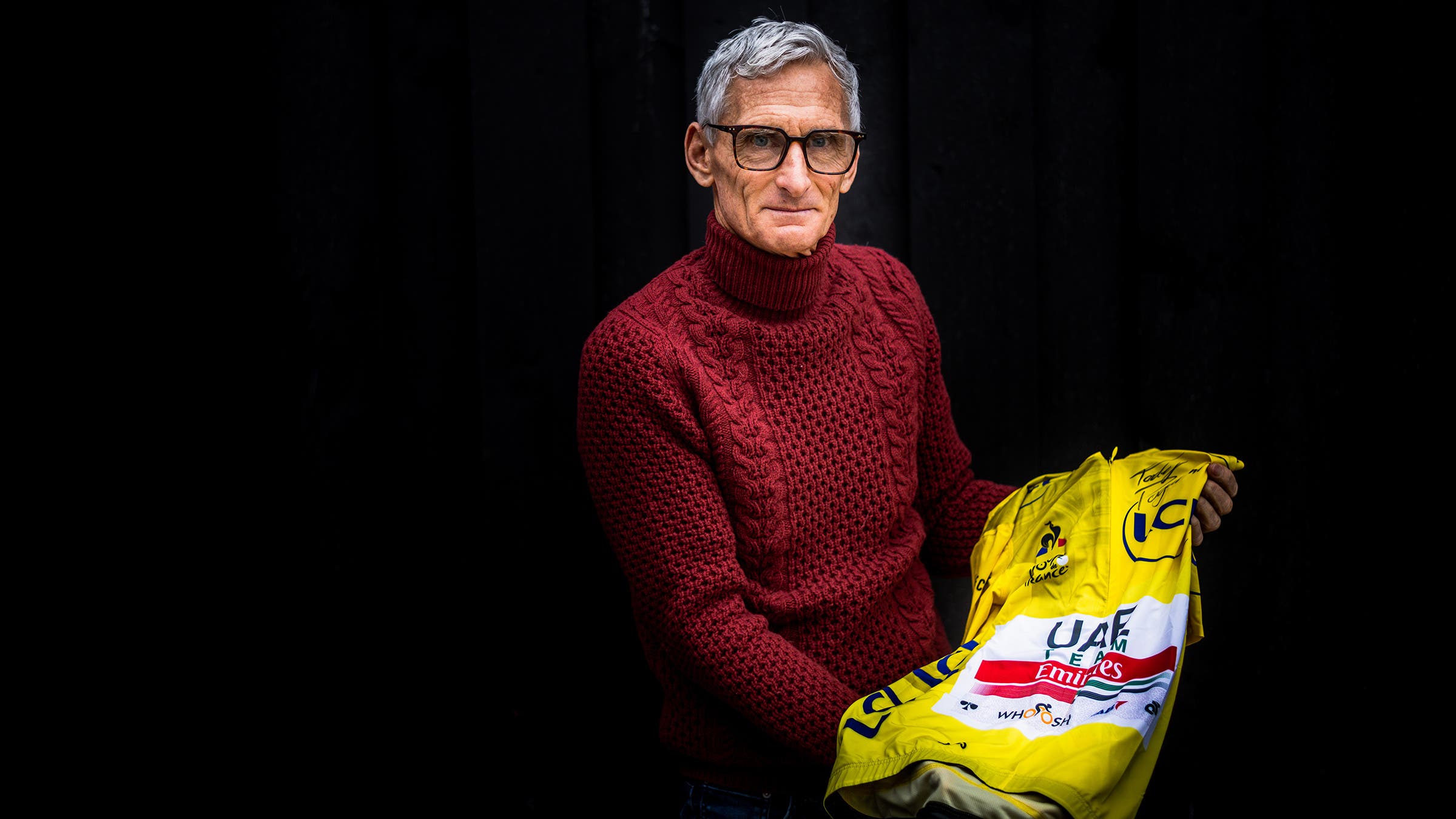
Allan Peiper, UAE Team Emirates’ lead sport director, stepped into Pogačar’s hotel room, and he could immediately see the disappointment on the young man’s face. It was the evening following stage 17 of the 2020 Tour de France, which finished up the mighty Col de la Loze, and Pogačar’s legs had finally weakened. Pogačar had come into the stage, and the Tour’s final week, hoping to carve time out of Roglič’s lead in yellow. Instead, he faltered on the Col de la Loze’s steepest ramp and ceded 15 seconds yellow.
Peiper, who has shepherded Mark Cavendish, Ryder Hesjedal, and other great champions, told Pogačar that the win was still within his grasp.
“There was a feeling of despondency after that stage — we had hoped to take 15 seconds or more out of Roglič to be within 30 seconds of him for the time trial,” Peiper told VeloNews. “Tadej is usually laughing and joking, but he felt
like there was a lesser chance of winning the Tour after that stage.”
Peiper and the other UAE Team Emirates directors knew that the only remaining opportunity to overtake Roglič was on the stage 20 individual time trial. And, while the 57-second deficit was sizable, he still believed it was possible for Pogačar to close. Just a few stages prior, Peiper had delivered a passionate pep talk to the battered UAE Team Emirates squad — its best climbers were out of the race, and rouleur Marco Marcato had an infection — and proclaimed the Tour’s yellow jersey within reach. All the team had to do was protect Pogačar before the time trial, and then the youngster’s legs would do the rest.
Peiper’s confidence sprang from Pogačar’s body, and also from the reconnaissance efforts that the team had invested in the final time trial. Peiper had traveled there in June to drive the route, twice, and take notes on the terrain. Then, in July, he returned, alongside Pogačar and Mikkel Bjerg. The men rode the route three times, and Pogačar gave it full gas on the final lap.
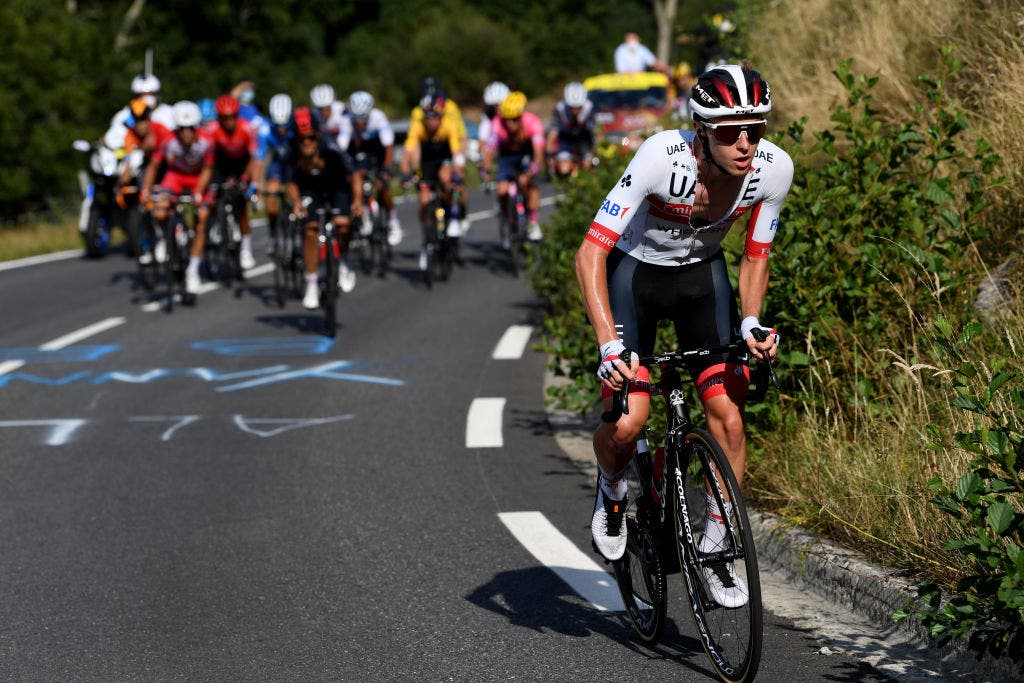
“We had booked a hotel 1.5km from the start so Tadej could relax and be quiet before the stage,” Peiper said. “That was a way to really seal the deal on reducing the stress before the race.”
The last element to Peiper’s confidence sprang from Pogačar’s attitude. Cycling is a sport that rewards athletes who are strong in the legs and in the mind. Stress and self-doubt contributes to a rider’s fatigue throughout a race, and veteran directors can spot stress in a rider through his body language and day-to-day interactions. Throughout the Tour, Tadej Pogačar was cool and collected at every turn.
“I never saw him nervous, not for one minute,” Peiper said. “The sense of not stressing about stuff gives him five percent more in power. He’s sleeping better. He recovers better, and that’s what sets him apart.”
Even the morning of the time trial, Pogačar had a carefree attitude in and around the team. Mechanics had built a time trial bike for the race’s first half, equipped with a 58-tooth front chainring and an 11/29 cogset in the rear. He would change to a road bicycle for the brutal climb. Pogačar saw that the mechanics were also building a white road bicycle for him to ride the next day — should he wear white into Paris in the Best Young Rider jersey.
“He poked his head out of the bus and said to the mechanic, ‘What? You don’t think I can win,’” Peiper said. “When I saw him relaxed and joking, that made me a lot more confident.”
San Millan watched the time trial unfold from his home in Denver, Colorado, while Peiper watched it from the passenger seat of the team car, just behind Pogačar. As Pogačar sped through the course’s opening half, Peiper eyed the time splits and saw the margin for victory blow wide open. Roglič’s splits were far slower than Pogačar’s, and Pogačar had yet to reach the climb.
At the base of the steep climb Pogačar dismounted his tt bike and climbed aboard a road bike, and roared up the road.
“We knew we were in with a chance — he was just a few seconds out of the yellow jersey at that second split,” Peiper said. “We didn’t want him to get too excited. After three weeks, anything could happen. He knew he was up. He knew he could win.”
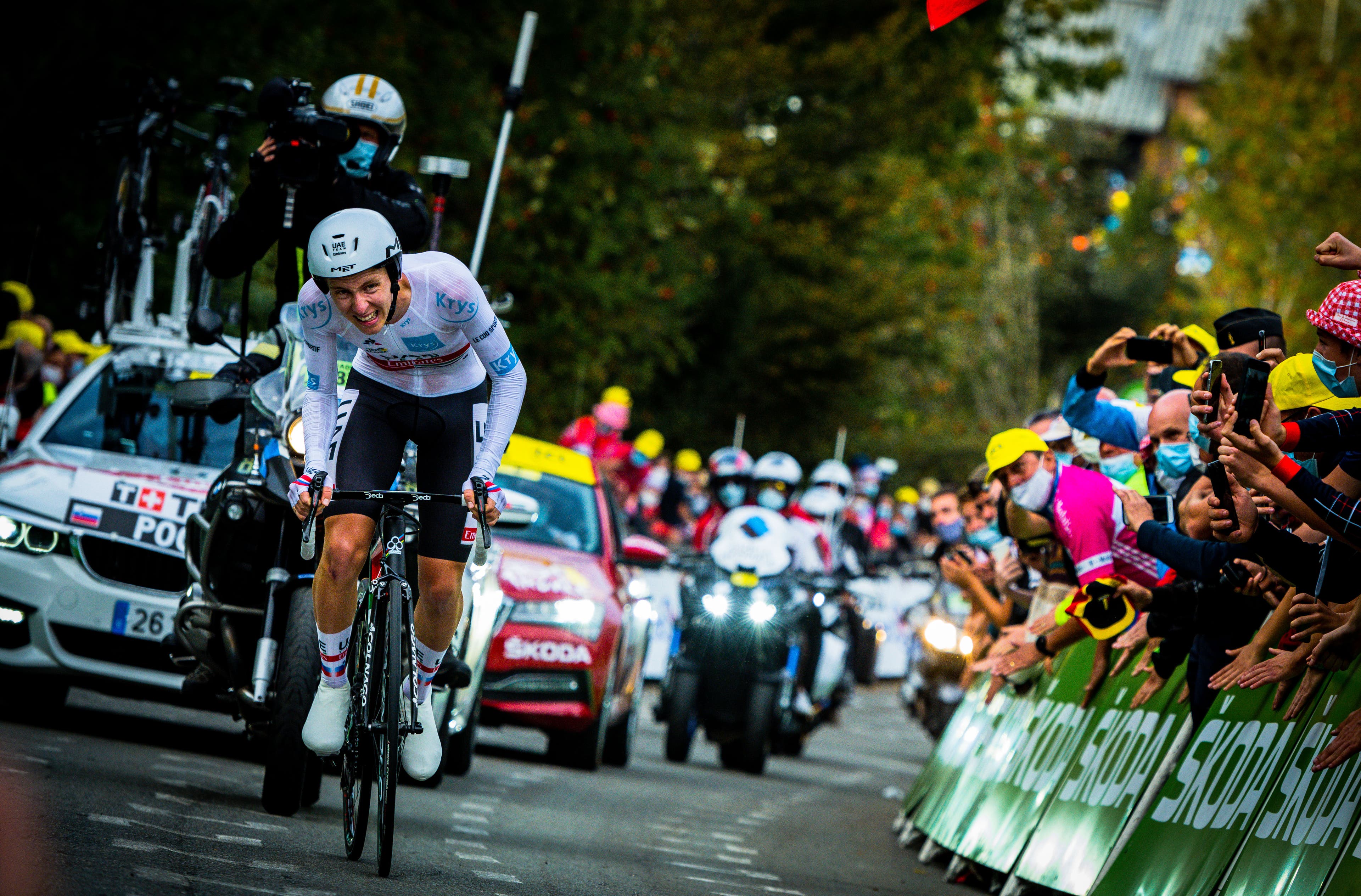
There are no guarantees in pro cycling, of course, and even the most gifted athletes falter during big moments. Peiper could not know whether or not Roglič would have the ride of his life to maintain his gap, or whether the Slovenian would falter. But for Peiper, who has been in the sport since the late 1970s, Pogačar had the attitude that was required to unleash a momentous ride at the best possible time.
“It wasn’t a complete surprise that he won,” Peiper said. “We could see it building throughout the race. It was all about who was going to have the legs in the final week, and we knew what he was capable of.”
The outcome that was so unexpected — perhaps it’s something we should have seen coming.